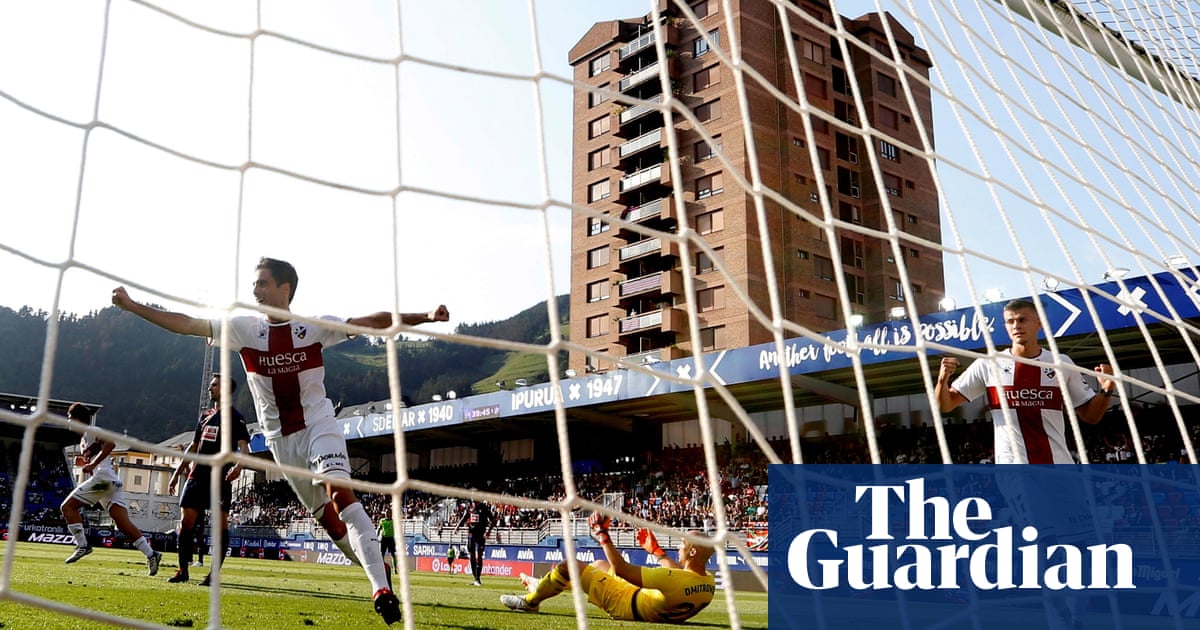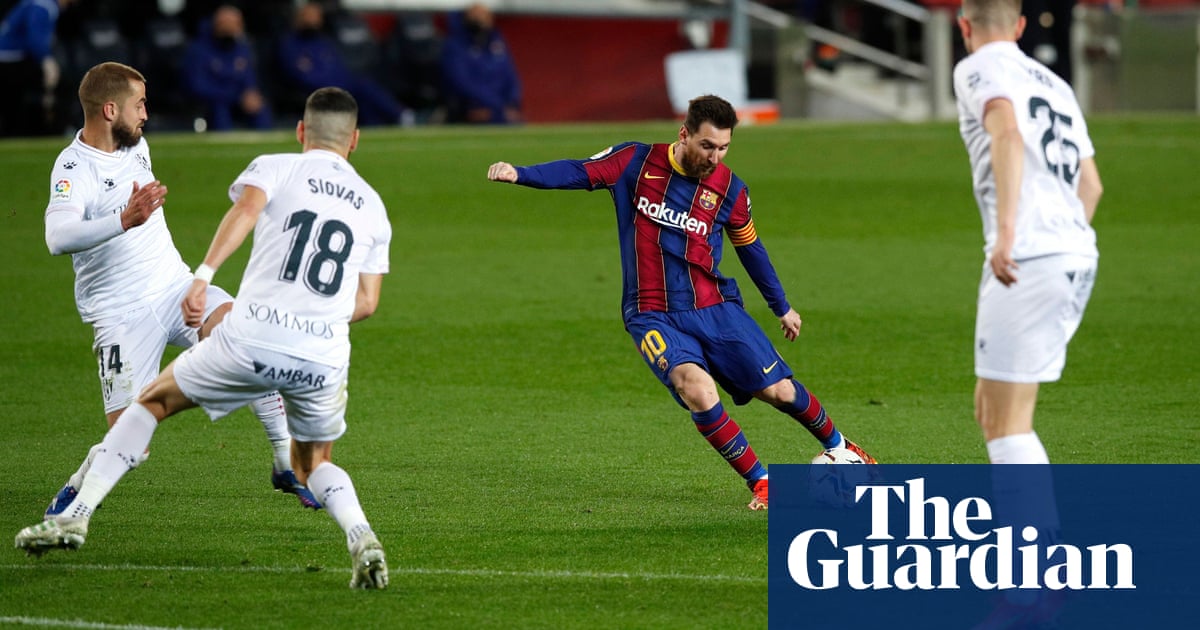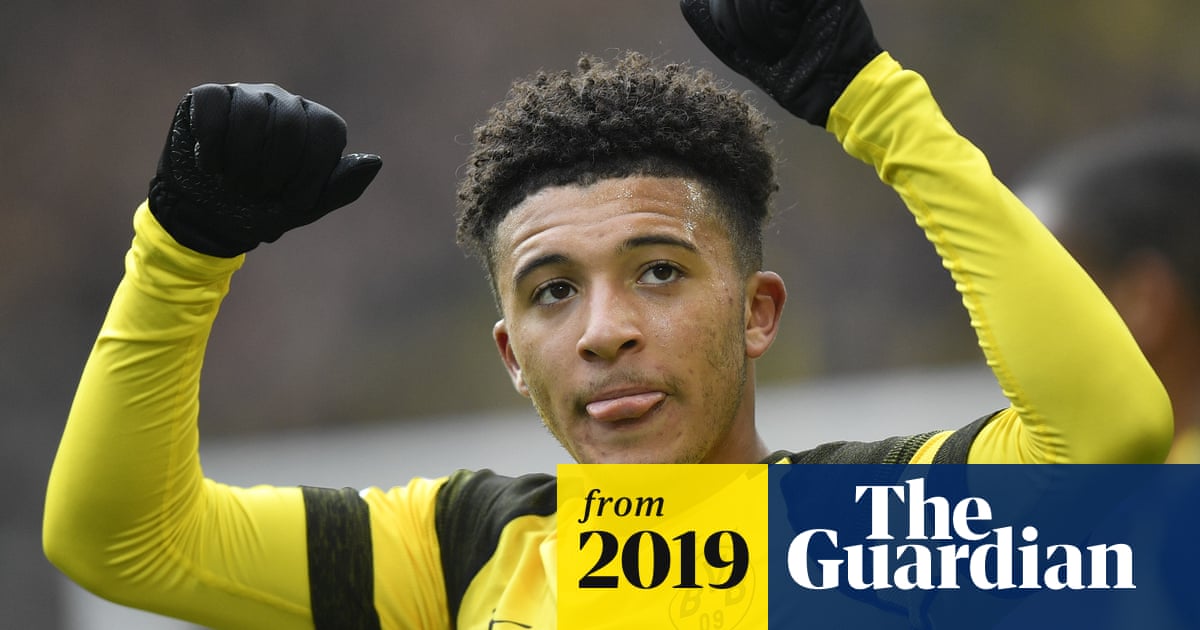Huesca

La Liga returns as modest Huesca make a major impact | Sid Lowe
On the opening day of the season, the happiest boy in the Basque country was in the stand on Indalezio Ojanguren street, when his cool older cousin came across to get him. It was full-time and everyone had left the pitch at Ipurúa, the picturesque little home of Eibar, but Huesca winger Álex Gallar headed the other way towards the family that had flown in from Mallorca, lifted him over the barrier and together they walked across the grass holding hands, waving at the 500 fans at one end. Then they disappeared down the tunnel and turned right in the direction of the dressing room, where celebrations had started, thud-thud-thud audible through the walls.
Not long after, in one corner of La Liga’s smallest stadium, he stood wearing one Huesca shirt and holding another – three times the size he is and sweaty still – smiling and watching, eyes wide, as Gallar stood in front of a TV camera and tried but mostly failed to find the words. When the camera failed too and they fiddled, trying to get a loose screw to go back in, Gallar grinned at his cousin, grinned at the little pack of fluffy radio mics across the room, shrugged and said: “Them next.” Now they all wanted to talk to him. He had, after all, just scored twice, the first of them wonderful, gliding in left-footed with a swish of the hips and a dip of the shoulder, going past two and easing smoothly, almost gently into the area before finishing with his right.
Although Atlético Madrid and Valencia are still to meet, it might have been the best thing on view in week one as another year began in Spain – along with Santi Cazorla starting a competitive game for the first time in 669 days; André Silva scoring as many in a single evening as he had in the whole of last season, getting the first opening-night hat-trick for 25 years in Sevilla’s win at Rayo; Leo Messi making the ridiculous routine; Marc-André ter Stegen’s frozen veins; and Toni Kroos trying to convince everyone he was happy, it’s just that football at midnight is a little late. It certainly could have been the best goal, even if he doesn’t say so himself.
“When you see Messi and [José] Morales, it’s left behind,” he insisted. “Morales is Maradona” read one headline after the Levante winger ran from the halfway line to score an absurdly good second goal against Betis on Friday. And the following night Messi was, well, Messi. Yet neither goal had quite what Gallar’s did the next day. “It was a good goal,” he said. Good? “OK, great.” It was also what it meant. “For us, it’s history,” Gallar said.
Gallar scored the goal that took Huesca to the first division. But he had never scored in the first division before. Which isn’t surprising: he’d only been playing in primera for four minutes and 43 seconds.
A fortnight ago, he opened a packet of football stickers and found his own face smiling back at him – a “daft thing that means something”, as he put it. Gallar is 26, but he had never been in the first division and never really been close. His career path reads: Rubí, Murcia B and Terrasa, all of them in tercera – down where there are there 366 teams – then Cornellá, Herculés and Cultu, all in Segunda B. The first time he even played in segunda was last season.
Sign up to The Recap, our weekly email of editors’ picks.
He is not alone. The 63rd team to make it up, this is Huesca’s first season in primera. They started 2014-15 in Segunda B and had only reached the second division for the first time in 2009, getting relegated in 2013. Theirs is a history mostly spent in tercera and although they were taken over by José Antonio Martín “Petón” in 2006, bringing the backing and interest of his agency Bahia, they remained unlikely occupants of first division, where their budget is this season’s smallest. One recent article suggested promotion had put them on the map and for once it wasn’t (just) an irritating cliche. At the foot of the Aragonese Pyrenees, Huesca has a population of just 52,000.
Gus Poyet melts down as Bordeaux go from crisis to crisis
Last season, their budget was 16th in the second division. Their top scorer, Cucho Hernández, was on the division’s minimum wage, just over €65,000. His salary has gone up – “a bit,” one director says. Alcoraz, their ground, is being expanded as well – to around 7,500 – and won’t be ready until week four. Last season’s average home gate was 4,100 and that had increased almost tenfold in a decade. On Sunday, around 500 made the trip. They mostly saw familiar faces although coach Rubi departed for Espanyol. Promotion secured, seven players left, but Gallar is one of 16 who stayed. The idea is that doing so delivers a certain justice, an opportunity for those who earned it, and continuity too, but it also means inexperience. Of the starting XI, five had never played in primera, while a sixth had played a solitary game and, of the rest, only two were there last season – and one of those, Luisinho, got relegated.
But here they were, five minutes in and a goal up. Soon it was 2-0, Gallar’s inswinging free-kick escaping everyone and bending into the corner. It might have been more, yet this was still better than they could have ever imagined. At half-time, up in the directors’ box, there was a whispered: “End it now.” “I never even dreamed this,” someone said, beaming but nervous. With reason, too: Eibar came back at them, scored, and for half an hour Huesca struggled and had to hang on, although they might have added a third on the break.
Huesca’s players celebrate in the win. Photograph: Javier Etxezarreta/EPA
Eventually, the whistle went. Huesca had won and deservedly so. Asked if the defeat was fair, the Eibar manager, José Luis Mendilibar, replied: “Pffff … Yes, very, very fair. They had more play, more chances, more goals. They were brave and did us a lot of damage.”
Through the walls, you could hear the thudding, the happy noise. “It was a dream debut,” said the Huesca manager, Leo Franco.
Only three debutants had won away on the opening day in 70 years, although it is true that good starts have been quite common of late – Eibar in 2014, Leganés in 2016, Girona last year – just as it is true that this was only three points, only the start, and it was not San Mamés or the Camp Nou (they’re up next). Instead, it was Ipurúa and Eibar: the one ground, the one club, the one town, that might even be smaller than Huesca.
And yet that was part of the point. Both Villarreal and Auxerre have been cited as examples to follow, while what newly promoted Girona did last year has caught their attention too, and recent seasons have thrown up significant overachievers. It is Eibar, though, who are arguably the clearest model to follow, offering hope amid the likely hard times.
The Eibar model: another kind of football is possible Guardian
It is easily forgotten that only four years ago Eibar were making a first division debut of their own. There was a sense of something shared on Sunday. Before the game, fans ate together, as did the kitmen from both teams; Huesca supporters sat all around the ground, not just at the end; and Eibar staff spent time explaining to their visitors just what it’s like up here. In a room downstairs, a pennant hangs from when these teams met in the Second Division B in 1965: time together on an entirely different level. It’s easy to become blase about it all, but the fact that they were playing each other in primera on Sunday shouldn’t be so easily dismissed.
“I went to a conference given by the president who bought them up [Alex Aranzábal] and he told the story of how they did it,” Leo Franco said. “They’re an example to us, not just as a team but as a club: they came up and consolidated, it’s been four years now.” The point needed reinforcing, this was not just a public platitude and so, as he left, he approached and whispered: “Four years is loads, eh?” For Huesca it was just one day, but it had been a lot of fun. Gallar certainly enjoyed it and so had his little cousin, standing there watching it all – this new world – with a proud look on his face and Huesca shirt in his hand.
Talking points
“Bale claims the throne,” AS said on the front. “Bale takes the flag,” AS said inside. “Bale takes control,” said Marca’s cover. “Bale puts himself at the front of Madrid,” it said inside. A page further on, it calls it “Bale’s league”, which might be just a little bit premature, but the excitement is understandable. And they need someone – even if the front page on the opening morning was still occupied by Cristiano Ronaldo. Oh, and El Mundo’s headline, in case you’re wondering, was a little more poetic. “Bale runs to paradise lost,” it says.
Real Madrid’s Gareth Bale celebrates scoring their second goal against Getafe with Marco Asensio. Photograph: Sergio Perez/Reuters
Messi, though. Blimey.
Morales might have ended up with a hat-trick for Levante. And maybe a Spain call-up will come. He’d deserve it more than many others. It wasn’t supposed to be this way. Betis’s fans, optimism overflowing, started the night singing and finished it whistling. As for Levante, get this: if there was a league table just for the games that have been played since Paco López took over they’d be top.
In a country where so much of the media loves to furiously debate, angrily attacking each other, fighting from familiar trenches, isn’t it a bit strange that when there really is something to debate – the Super Cup in Tangiers, taking the league to the US – they don’t?
August, 10.15pm. Everyone still away. And so the Camp Nou and Bernabéu register their lowest attendances for years – a decade in Madrid’s case.
Girona 0–0 Valladolid, Betis 0–3 Levante, Celta 1–1 Espanyol, Villarreal 1–2 Real Sociedad, Barcelona 3–0 Alavés, Eibar 1–2 Huesca, Rayo 1–4 Sevilla, Madrid 2–0 Getafe. Monday night: Valencia-Atlético, Athletic-Leganés.Quick GuideShow
Continue Reading
To continue reading please choose to download our free app, or visit the original website.
Latest Huesca News
League Table
Illuminate\Database\Eloquent\Collection {#1890 // resources/views/components/league-table.blade.php #items: [] #escapeWhenCastingToString: false }
























